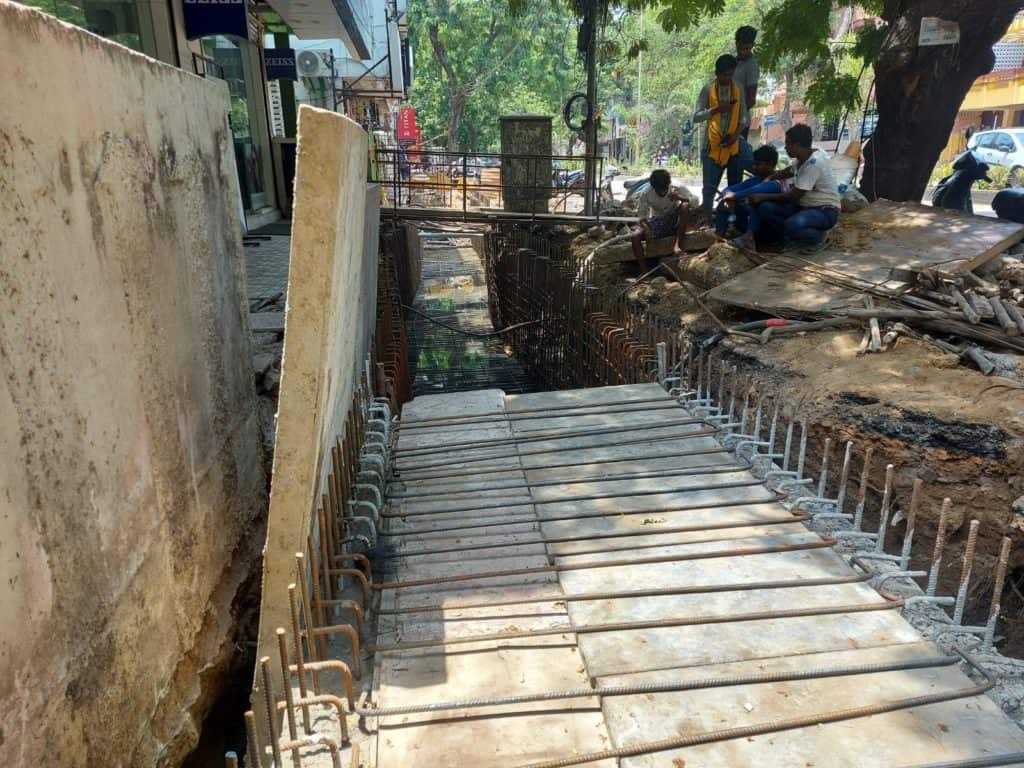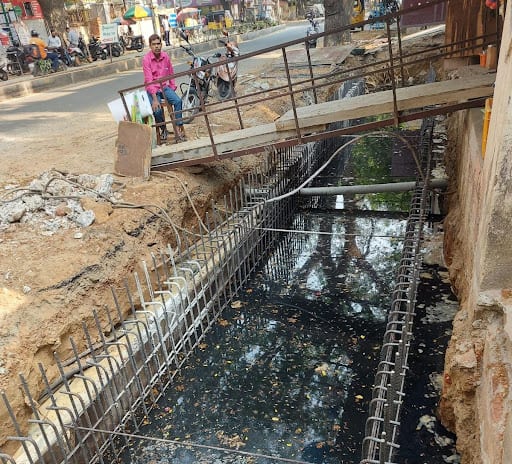Ormes Road resident Dr Muralidharan was in for a rude shock when he tried to leave his home to attend to a medical emergency. The area outside his home had been dug up by the Tamil Nadu Electricity Board, leaving him no way to get his vehicle out quickly. Road digging in the locality that lasted for weeks had resulted in roads not being repaired and relaid.
This has been the reality of many residents across Chennai as works by various agencies for stormwater drains, underground cables, water and sewage pipelines are being laid, relaid or repaired.
Road digging issues balloon in Jawahar Nagar
A month ago, a stormwater drain project was initiated in Jawahar and Periyar Nagar in TVK Road in Zone 6. The roads were dug up by the Greater Chennai Corporation (GCC), right outside the entrances of homes, apartment complexes and shops in 70 Feet Road. Residents were unaware of such a project by the GCC though it directly affected their living conditions.
The day after the digging started, two wooden planks were placed at the entrances of buildings, one on top of the other, acting as a bridge between the buildings and the functioning road. These planks were poorly laid out and were often too shaky for residents to use.
People couldn’t leave their homes due to the digging. One resident even recalls jumping from his back wall onto the parallel road behind his house as the trenches outside the entrance were too wide and deep. A resident, who did not wish to be named, also pointed out how the EB wires at the site of the digging were found emitting smoke. This issue was resolved only with the intervention of the local councillor.

Read more: Why road milling work calls for active involvement of Chennai citizens
Road digging led to a host of other problems in the area. For one, existing pipes carrying water and sewage were broken. This led to drinking water getting mixed with the sewage water. Sewage water also started to stagnate in pools right outside the homes. This led to a foul smell and turned into a breeding ground for mosquitoes.
When speaking to the workers and the contractor of the project, residents were told that the work would be done in 20 days. However, when residents spoke to the Zonal Officer and Councillor, they mentioned that the work would likely take a month to be completed.
One of the residents, Senthil Kumar, complained about the mosquito menace to the civic body via the ‘Namma Chennai App’. While civic body workers did come and spray repellent on the streets, nothing was done to deal with the stagnant sewage water.

“Our metro water pipe and drainage pipe are broken and the GCC is saying that they can’t fix it as it belongs to Metro water. Metro water representatives are saying that the civic body should do it as it was broken during the course of their work. We as the residents are facing issues because they keep passing the buck”, says Senthil Kumar, a resident.
TNEB works in Kilpauk causing inconvenience
In the case of Ormes road, the TNEB dug up areas along the street at the entry point of multiple houses and shops in order to set up three electrical lines. Deep trenches lay wide open in front of people’s homes, without any action taken to close them quickly. In fact, the electrical lines for which the roads were dug up have been set up and covered by a line of concrete blocks.
Residents have so far made complaints to the Assistant Engineer in Shenoy Nagar, and assurances were given that the trenches would be covered. Despite assurances, they continue to remain open, with few reports of people having fallen inside when trying to jump over them.
The dug up earth has also been left there by the trenches since the beginning, even though road cutting guidelines state that the earth should be removed. It has also been 6-7 weeks since the digging began, which is past the usual one month deadline per the guidelines.
In the early days of the digging, the common issue of sewage and water pipes being cut occurred. This led to stagnation, with many not receiving water for several days. However, in this case, metro water was responsive to the complaints of residents and fixed the pipes when called to do so by the residents.
What the guidelines say
The guidelines and rules for road cutting set out by the GCC state that all road cutting works initiated by service departments such as the metro water, TNEB or any public or private telecom companies require permission from the Bus Route Roads Department. In the permission documents, the departments are to specify the areas where they are planning to dig, the size of the road cut and duration of the work.
The BRR/Zonal Engineers have to inspect the site and prepare the estimate for road cut restoration charges as per the Schedule of Rates of the current year, and get approval from the Competent Authority. The approving authority differs based on how old or new the road is. This initial permission should be submitted online. The service department is in-charge of covering the dug up roads.
- The minimum width of the road cut will be taken as 1.00m or it will be increased as per the request of the service department depending on the work.
- The excavated earth should be fully removed from the site by the service departments.
- The service departments/service providers need to submit a schedule or programme for cutting open the road for laying the cables/pipes through trenchless technology / trenching through BRR / Zones.
- When road cut work is being carried out, the service departments should take preventive steps to ensure that no accidents take place. The applicant is liable to pay compensation to the departments/ local bodies / individuals concerned for any accident that is caused.
- Traffic police should be informed in advance and necessary permission has to be obtained from the traffic point of view, wherever required. After getting police permission, the probable date of commencement and completion date should be informed to BRR Department / Zone.
- The road cut permission will be valid for a period of one month from the date of issue of permission.The applicant has to execute the work within the time limit.
- The agency doing the road cut should inform other service departments before commencement of the work in advance
The complete guidelines can be found here.
Read more: Tired of your road being laid and relaid? Don’t be silent!
Failure to follow road digging guidelines
It can be seen that quite a number of these guidelines have not been given much heed when carrying out road digging in the instances stated. Even red flags, danger lights and boards which were necessary for crossing as per resident’s requirements were not provided.
In addition, the service department should inform other service departments that the work is being done. This would ensure that important pipelines such as those carrying people’s water and sewage are not affected in the process of digging, or they can be speedily repaired in case of damage.
The case of Jawahar and Periyar Nagar shows a complete lack of coordination between the service departments. GCC and the metro water department have been unresponsive to the complaints of residents. In Ormes Road, though metro water has addressed a part of the issue, the dangers of the deep trenches dug by the TNEB remain.
Ultimately there seems to be a lack of standardised, uniform service from these departments. Residents also alleged that such civic works get carried out without the requisite permission under the guise of it being a quick fix. But if the road digging leads to larger issues such as breakage of pipes, the residents are unable to get the agencies to respond in a timely manner.
The initiation of new stormwater drains projects in North Chennai, the accelerated pace at which existing storm water drains are being repaired, projects by metro water to provide water and sewage connection for all are all instances which will see road digging across the city. Service departments must assume greater responsibility in adhering to the guidelines while the monitoring mechanism on works carried out in Bus Route Roads and Interior Roads must be strengthened. Streamlining of complaints by residents is the need of the hour as many are unaware of who can take action on such issues.